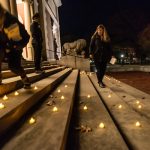
Dr. Alejandro Chediak
Dr. Alejandro Chediak’s lectures are some of the few during which you are allowed to fall asleep. “If you happen to fall asleep during my lecture,” he reassured an audience at Bowdoin last week, “don’t worry.”
Chediak, former president of the American Academy of Sleep Medicine and father of Dani Chediak ’13, spoke last Thursday to students, athletes and staff gathered at Helmreich House about the connection between sleep and performance. The Office of Residential Life in conjunction with Health Services and Bowdoin Student Government worked to bring Chediak to campus through the Kurtz Fund.
“Sleep doctors are very unusual people,” he explained, “because, in contrast to most of the world, we actually think that, if you’re sleeping, it’s a more important behavioral state than if you’re awake.”
Chediak’s lecture addressed sleep loss on a national level, examined basic sleep-wake regulation and the relationship between sleep loss and impairment, and proposed fatigue risk-management strategies for one of America’s most sleep-deprived populations: college students.
Sleep loss is a significant national issue, Chediak said. About 21 percent of the population, or approximately 70 million Americans, sleeps fewer than six hours a night. “This is America,” he said. “We work around the clock.”
Sleep loss on this scale creates performative risks that are responsible for hundreds of billions of lost dollars in production and incur huge health-related costs every year. A New Jersey law makes it illegal to drive after being awake for 24 sustained hours, he said. The performance at that level of wakefulness equates roughly to that of a 0.1 percent blood alcohol content.
For maximum productivity, Chediak recommended taking short pauses when performing a task and encouraged staying awake for no longer than 16 sustained hours. “Take breaks,” he said. “Part of your academic success is based on how well you can remember things.” Getting good REM sleep after and before learning is important to consolidating memory.
The important question to ask, Chediak said, is, “How is sleep loss affecting me?” If you feel fine the next day, that isn’t a problem. If you’re tired, then it’s time to ask, “What can I change?”
Director of Health Services Sandra Hayes, who attended the lecture, noted that many of the problems of anxiety, the common cold and mono are exacerbated by sleep deprivation. “It lowers the immune system,” she said. “I am very grateful we had this presentation, and I think a lot of students can learn and benefit from it.”
Story by Melissa Wiley ’13
